Читать книгу Principles in Microbiome Engineering - Группа авторов - Страница 48
1.3.5.1 Obesity
ОглавлениеThe gut microbiota composition affects the host's ability to digest different types of food, thereby causing the host to metabolize the nutrients from the food itself. In 2004, a group determined that the gut microbiota regulates lipid storage in the human body [271]. Later in 2006, they found significant differences between the relative abundance of Bacteroidetes and Firmicutes in the GI tract of obese and lean mice. The study also reported that FMT of samples from obese mice to germ‐free mice resulted in the development of obesity pre‐symptoms [131]. The same research group further studied the GI microbiota from monozygotic and dizygotic twins with different weight groups (lean and obese) and discovered large variations in the gut microbiota despite having similar genetic makeup [45]. The research team then conducted FMT of microbiota from the identical twins into germ‐free mice. Groups provided with FMT from lean donors maintained normal weight, while groups treated with FMT from obese donors gained a significant amount of weight throughout the study [272].
The role of gut microbes in regulating fat storage in their human host is mainly attributed to the ability of these microbes to ferment complex polysaccharides that the host generally cannot absorb from the diet [273]. Microbes such as B. thetaiotaomicron have been shown to induce the expression of monosaccharide transporters in mice [274], where the polysaccharides are hydrolyzed into monosaccharides and SCFAs for easy absorption by the host intestinal cells. The increase of sugar uptake is then converted to lipids in the liver, triggering intestinal microbes to facilitate host expression fat metabolism gene Fiaf resulting in the accumulation of excessive fat [275]. Other studies have shown that orally introduced probiotics in mice fed with a high‐fat diet prevent the perturbation of intestinal mucosal permeability and limit energy absorption. These oral probiotics exert such bioactivity by reducing plasma LPS and cytokines and promote the gut secretion of glucagon‐like peptide‐1 (GLP‐1) and glucagon‐like peptide‐2 (GLP‐2) involved in maintaining the intestinal mucosal barrier [276].
